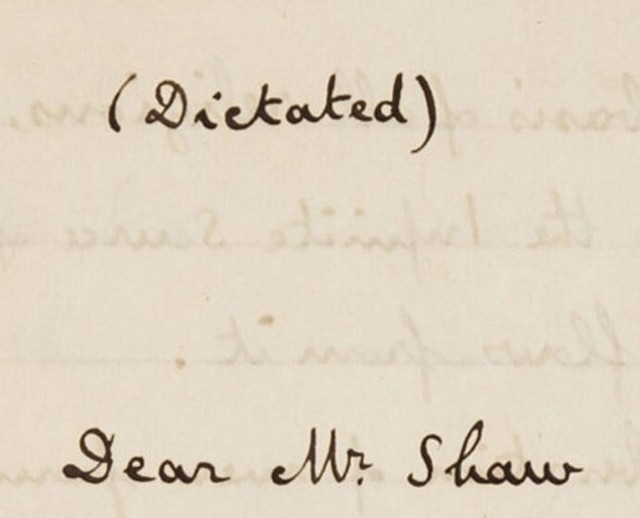A Letter From Tolstoy
Would you like to buy something weird? Hammer Time is our guide to things that are for sale at auction: fantastic, consequential and freakishly grotesque archival treasures that appear in public for just a brief moment, most likely never to be seen again.

In January of 1908, Leo Tolstoy was still seven months from responding to George Bernard Shaw, who had sent him a copy of Man and Superman, but the Irish playwright was very much on the his mind. Tolstoy had read Shaw’s four act drama — twice — and many of the others that came before it. “His vulgarity is amazing,” Tolstoy wrote in his diary. “Not only does he lack a single thought of his own rising above the vulgarity of the urban throng, but he does not understand a single great idea of the thinkers of the past.”
Why had Shaw sent Tolstoy his work in the first place? It had been three and four decades since Tolstoy had published War and Peace and Anna Karenina. His reputation as a master was long cemented.
But Shaw was not one to pray to idols. His criticisms of Shakespeare were well known, and those who dared to produce his plays did not escape Shaw’s ire; he thanked the actor John Barrymore, who had sent Shaw a personal invitation to see him play the lead in Hamlet, with a scathing letter. Shaw criticized composer Brahms’ “A German Requiem,” writing that “it could have only come from the establishment of a first-class undertaker.”
In Tolstoy, however, Shaw saw a man who shared his values — with the exception of his Christian beliefs. He quoted Tolstoy when he accused the English of prudery, which was often, and admired his indictment of capital punishment. They both railed against militarism and social corruption.
And Tolstoy believed the playwright was very talented. Too talented, he thought, to be so flippant. His three page response — which is now up for auction — to Shaw’s “book” may have been dictated in Russian, but it seems the message was not lost in translation: Be serious.
My second rebuke is that the problems you touch upon are of such enormous importance that for a man with so deep an understanding of the evils of our life and so brilliant a power of expression as you possess, to treat these problems merely as objects of satire may often rather do harm than contribute to the solution of these important questions.
As if to soften the sentiment expressed in his diary — Shaw “does not understand a single great idea of the thinkers of the past” — Tolstoy praised the playwright as well read, but that his erudite commentary was thwarted by attempts to impress the reader. In Tolstoy’s estimation, he was capable of much more.
At all events I think that this book of yours does not express your views in their full and clear development but only in their embryonic condition. I think that these views, developing further and further, will reach that one Truth which we are all seeking after and towards which we are all gradually approaching.
There were compliments in the letter, too. Tolstoy praised Don Juan’s interlude (though he thought that could have been more serious there, too), and liked Shaw’s “attitude towards civilization and progress — the perfectly correct assertion that however much the one and the other may continue, they cannot improve the state of mankind unless men become changed.”
The Russian novelist did not mean to offend, he repeated throughout the letter, and wished to be pardoned if he had. Shaw’s response, a lengthy rumination upon God, suggests that Tolstoy’s words challenged more than injured.
You said that my manner in that book was not serious enough — that I made people laugh in my most earnest moment. Why should humour and laughter be excommunicated? Suppose the world were only one of God’s jokes; would you work any the less to make it a good joke instead of a bad one?
If Tolstoy meant to reply, he had but little time to do so. On November 20, 1910, he died of pneumonia at the Astapovo train station. He had sneaked out of his house in the middle of the night just two days prior, in the dead of winter, in an attempt to escape his decades-long turbulent marriage, and, apparently, their aristocratic life. He was eighty-two years old.
The current online bid for Tolstoy’s letter to Shaw is $3,750. The auction concludes tomorrow. Update: And the auction closed at $6,250.
Alexis Coe’s first book, Alice+Freda Forever: A Murder in Memphis, will be published later this year. She has contributed to the Atlantic, the Paris Review Daily, Slate, the Toast, the Hairpin, and many publications.
